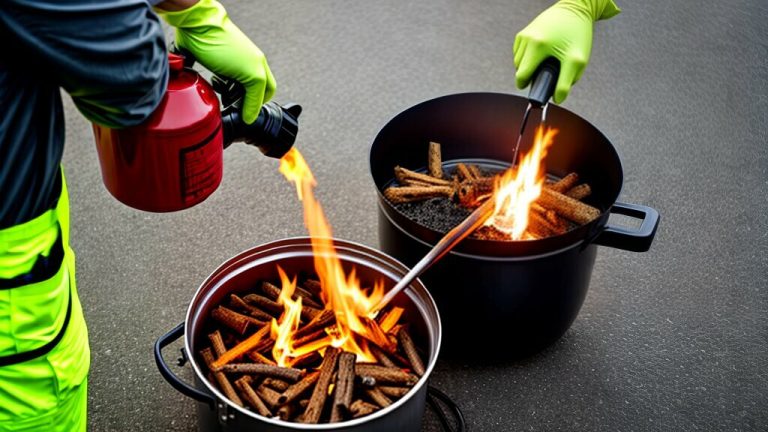Lighter fluid is a common household item for starting fires in grills or fireplaces. However, disposing of it improperly can lead to serious environmental and community hazards. It’s important to properly dispose of this flammable liquid to prevent fires, contamination, or harm to wildlife.
This article will cover the safest methods and tips for disposing of lighter fluid responsibly, including eco-friendly options, proper disposal steps, and local regulations; also know simple steps to refill zippo lighter.
Key Takeaways:
- Improper disposal of lighter fluid can lead to serious environmental and community hazards.
- Eco-friendly options such as recycling programs or hazardous waste facilities can help reduce waste and promote sustainability.
- Pouring lighter fluid down the drain is not a safe disposal option, and there are recommended alternatives.
The Dangers of Improper Disposal
Disposing lighter fluid improperly can have severe consequences for the environment and the community. The risks associated with improper disposal include:
| Risk | Consequence |
|---|---|
| Fire hazard | Lighter fluid is a highly flammable substance, and improper disposal can lead to fires that can cause significant damage to property and harm individuals. |
| Contamination of water sources | Discarding lighter fluid in sinks or drains can contaminate water sources and cause harm to aquatic life. |
| Harm to wildlife | Improperly disposing of lighter fluid can harm wildlife that comes into contact with the substance. |
Disposing of lighter fluid properly is crucial to avoid these hazards and ensure the safety of the environment and the community.
The Dangers of Improper Disposal
It is important to note that improper disposal of lighter fluid is a significant environmental and community hazard. The risks include:
- Risk of fire
- Contamination of water sources
- Harm to wildlife
Finding appropriate disposal methods and locations is essential to ensure safety and prevent potential harm.
Eco-Friendly Disposal Methods
As more people become aware of the environmental impact of improper disposal of hazardous materials, it’s important to consider eco-friendly options for disposing of lighter fluids. Here are some methods to keep in mind:
| Method | Details |
|---|---|
| Designated Hazardous Waste Facilities | Many communities have hazardous waste facilities that accept lighter fluid. Contact your local waste management department to find out where and when you can safely dispose of your unused lighter fluid. |
| Recycling Programs | Some recycling programs may accept empty lighter fluid containers. Check with your local recycling center to see if this is an option. |
| Reuse or Repurpose | If you have a large container of lighter fluid that you’re no longer using, consider repurposing the container. Clean it thoroughly and use it for storing other liquids or craft supplies. Be sure to label it clearly and keep it out of reach of children. |
It’s important to remember that not all disposal methods are created equal. Choosing an eco-friendly option helps protect the environment and reduces the risk of harm to people and wildlife. By taking the time to research and properly dispose of your lighter fluid, you’re doing your part to keep our communities safe and healthy.
Safe Disposal Steps
When disposing of lighter fluid, it is crucial to take safety precautions to avoid harm to yourself and the environment. Pouring lighter fluid down the drain is not a recommended method of disposal. Here are some safe disposal steps:
- Find a designated hazardous waste facility in your area that accepts lighter fluid. Contact your local waste management department or search online for disposal options.
- Before transporting the lighter fluid, ensure it is stored in its original container, tightly sealed, and labeled as hazardous waste.
- Transport the container securely uprightly, away from heat sources or flames.
- If no designated hazardous waste facilities are available in your area, some recycling programs may accept lighter fluid. Contact a local recycling center to inquire about their policies.
- Do not dispose of lighter fluid in regular household trash or recycling bins, as this can cause harm to sanitation workers and the environment.
Remember, proper disposal of lighter fluid is crucial to protect the environment and our communities from potential hazards.
By following these safe disposal steps, you can ensure a cleaner and safer environment for everyone.
Proper Disposal of Expired Lighter Fluid
Expired lighter fluid may not be as effective at lighting fires, but it can still pose a risk to the environment and people if disposed of improperly. Here are some tips for safe disposal:
- Identify the expiration date: Check the label or container for a printed expiration date. If it has passed, do not attempt to use the lighter fluid.
- Do not pour down the drain: Pouring expired lighter fluid down the drain can contaminate water sources and harm aquatic life. Do not use this method for disposal.
- Do not store in extreme temperatures: Extreme heat or cold can cause the container to burst or leak, posing a potential fire hazard. Store in a cool, dry place away from direct sunlight.
- Follow local regulations: Check with your local waste management facility to see if they accept expired lighter fluid for hazardous waste disposal.
- Recycle if possible: If recycling programs are available in your area for hazardous waste, consider recycling your expired lighter fluid container instead of disposing it in the trash.
Remember, expired lighter fluid should be treated like any hazardous waste and disposed of responsibly to prevent harm to the environment and people. Following these guidelines can help keep your community safe and clean.
Local Regulations and Resources
It’s important to be aware of local regulations and guidelines regarding the disposal of lighter fluid. The Environmental Protection Agency (EPA) provides resources and recommendations for responsible disposal methods on its website.
In some areas, it may be illegal to dispose of lighter fluid in the trash or pour it down the drain. Municipalities may have specific hazardous waste facilities designated for this purpose or hold hazardous waste collection events. Check with your local government or waste management agency for information on disposal options in your area.
Examples of Local Regulations
| State | Regulations | Resources |
|---|---|---|
| California | Disposing of lighter fluid in the trash or pouring it down the drain is illegal. | California Department of Resources Recycling and Recovery |
| New York | Household hazardous waste can be taken to designated collection sites | New York State Department of Environmental Conservation |
| Texas | Proper disposal methods vary by location; check with local waste management agency for guidelines. | Texas Commission on Environmental Quality |
Researching Local Guidelines
When researching local guidelines, start with your city or county government website. Look for information on waste management or environmental services departments. You can also check with the EPA’s state and local directory or Earth911’s recycling directory for resources in your area.
Remember that following local regulations and guidelines is not only important for environmental and community health but may also carry legal consequences for non-compliance. By educating yourself on responsible disposal methods, you can protect yourself and your community.
Alternative Uses for Lighter Fluid Containers
Don’t throw away those empty lighter fluid containers just yet! There are plenty of creative ways to repurpose them and reduce waste. Here are a few ideas:
- Vase: Clean out the container thoroughly and use it as a unique vase for flowers.
- Storage: The compact container is a great option for storing small items like nuts and bolts in the garage.
- Campfire Starter: Fill the container with shredded paper or dryer lint to create an easy fire starter for camping trips.
- Art Supplies Organizer: The container stores brushes, markers, or other art supplies.
Remember always to use caution and follow safety guidelines when repurposing any container, especially previously held flammable materials.
Safety Precautions for Disposal
When disposing of lighter fluid, it is crucial to take safety precautions to avoid any potential accidents or harm to oneself or the environment. Here are some important safety tips to keep in mind:
- Handle with care: Always cautiously handle lighter fluid and avoid heat sources, sparks, and flames.
- Store properly: Store lighter fluid in a cool, dry place and keep it out of reach of children and pets.
- Wear protective gear: Wear gloves and eye protection when handling lighter fluid to avoid skin irritation or injury.
- Don’t mix: Never mix different types of lighter or flammable liquids, as they can create dangerous chemical reactions.
- Avoid inhaling: Do not inhale lighter fluid vapors, which can cause respiratory problems.
- Be mindful of surroundings: Make sure the disposal location is clear of potential risks, such as flammable materials or water sources.
By following these safety precautions, you can ensure a safe and responsible disposal of lighter fluid.
Conclusion
Proper disposal of lighter fluid is important for the safety of the environment and the community. Improper disposal can lead to contamination of water sources, harm to wildlife, and even the risk of fire. It is crucial to follow safe disposal methods to prevent these hazards.
When disposing of lighter fluid, it is essential to be aware of local regulations and resources. Choosing eco-friendly disposal methods, such as recycling programs or designated hazardous waste facilities, is also important. Never pour lighter fluid down the drain or throw it in the trash.
Additionally, taking safety precautions when handling and disposing of lighter fluid is crucial. Always store it safely away from heat or flames, wear protective gear, and avoid smoking or other potential ignition sources.
Take Action for a Safer Environment
By following the proper steps for the disposal of lighter fluid, you can help protect the environment and ensure the safety of your community. Remember to check for alternative uses for empty containers to reduce waste and repurpose them for other uses. Together, we can take action for a safer and more sustainable future.

I’m Alfred Davis, and I’m all about lighters. Hailing from the great state of Texas, USA, I’ve cultivated a deep passion for these fascinating gadgets. With years of hands-on experience and a burning curiosity (pun intended), I’ve become an expert in all things related to lighters.
My journey with lighters began as a hobby and quickly became a full-blown obsession. I’ve explored the diverse world of lighters inside and out, from classic Zippo designs to modern plasma arc models. I’ve tested, tinkered with, and even collected rare pieces while learning the intricate mechanics and unique histories behind each one.
Through my writing, I aim to share my knowledge, insights, and reviews to help you make informed decisions about choosing the perfect lighter. Whether you’re a seasoned collector or just looking for a reliable fire source, I’ve got you covered. Join me in unraveling the fascinating realm of lighters right here at LightersInfo, where ignition meets expertise.
Alfred Davis

